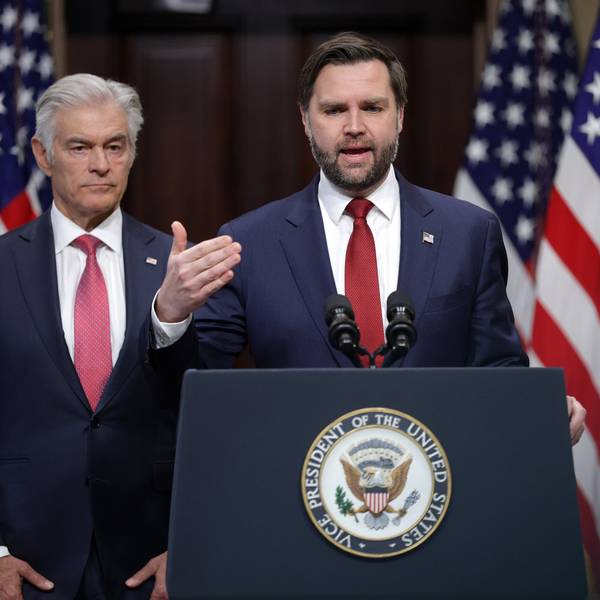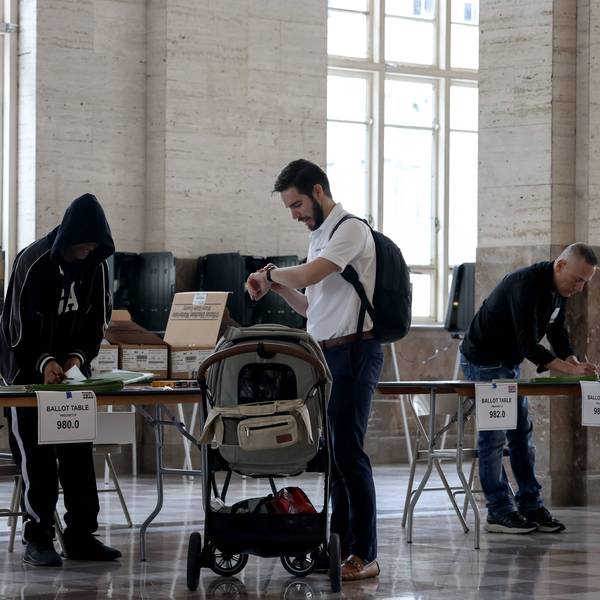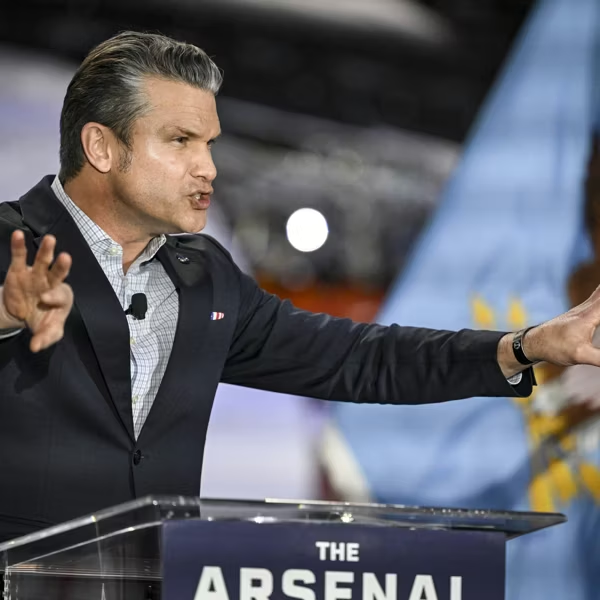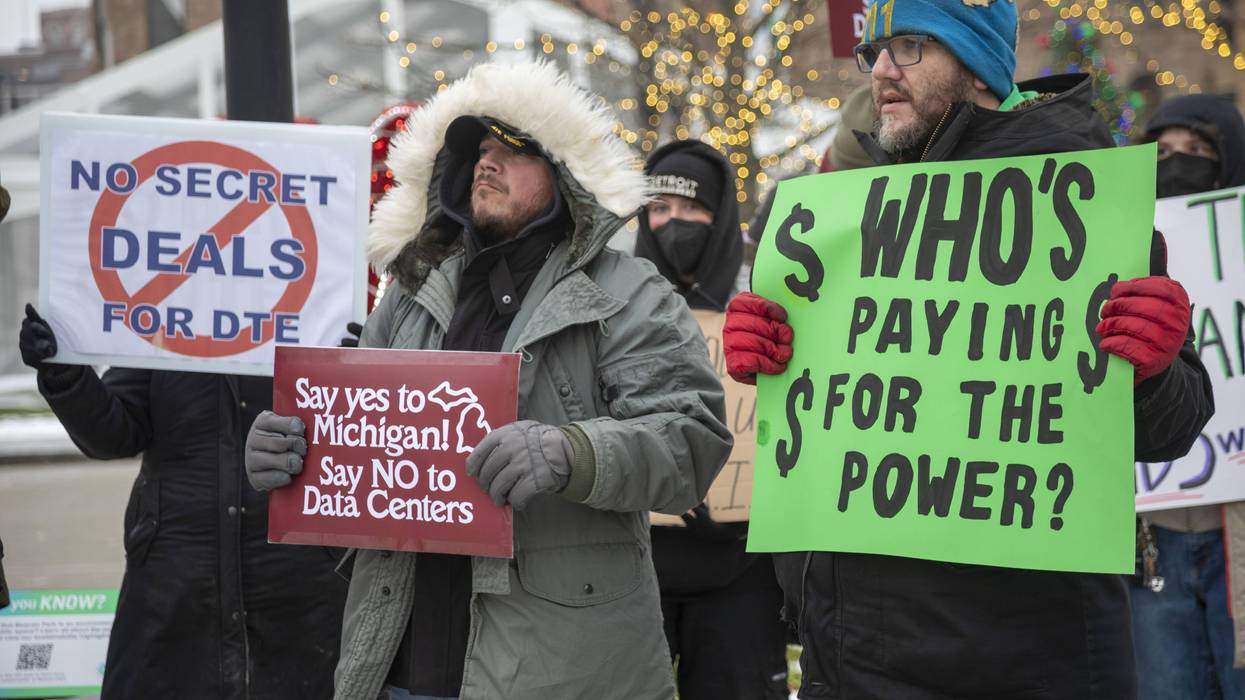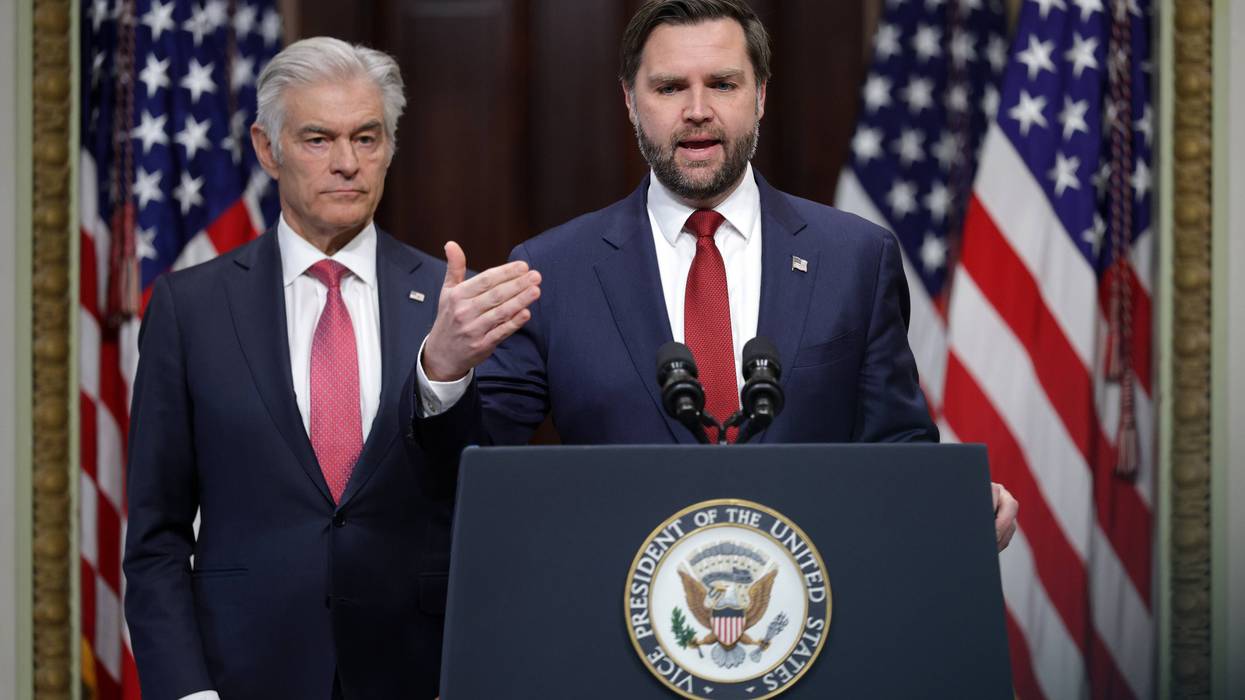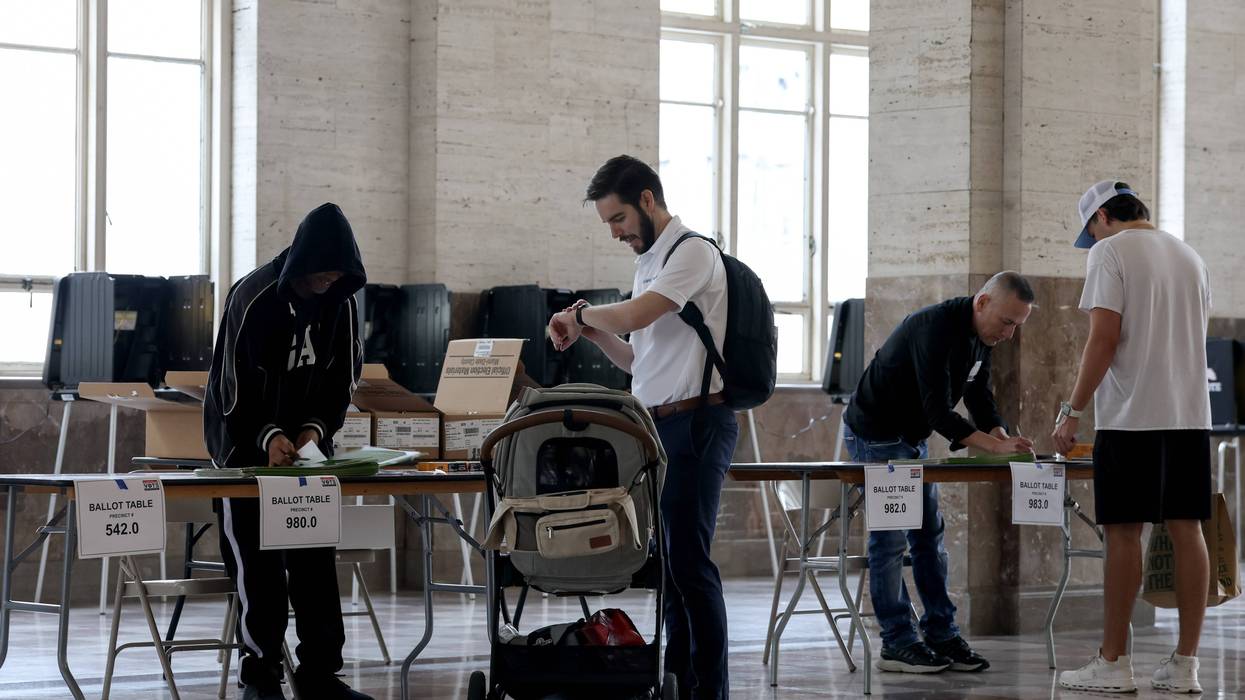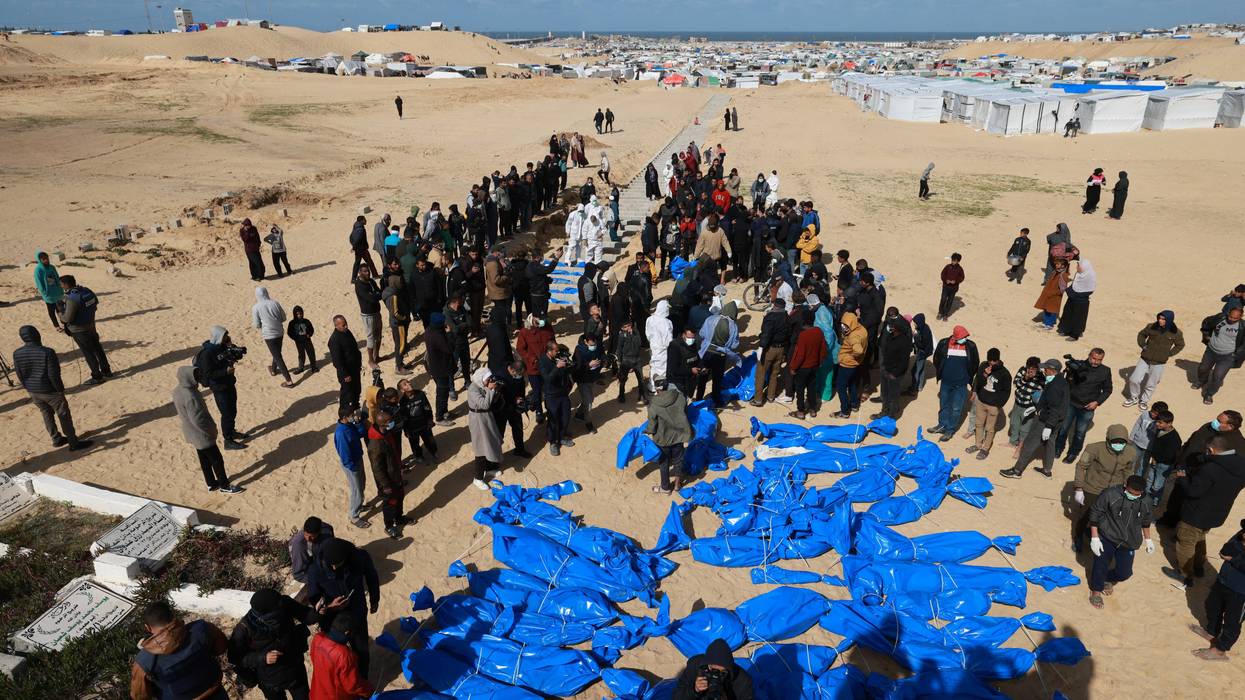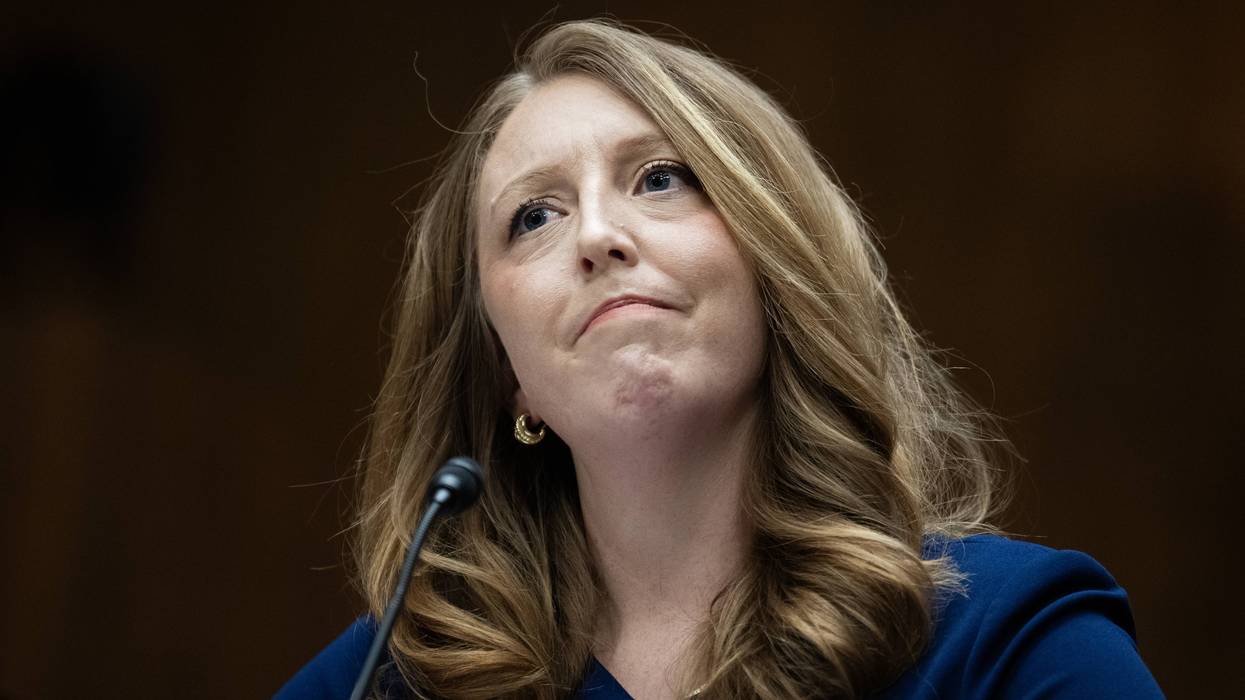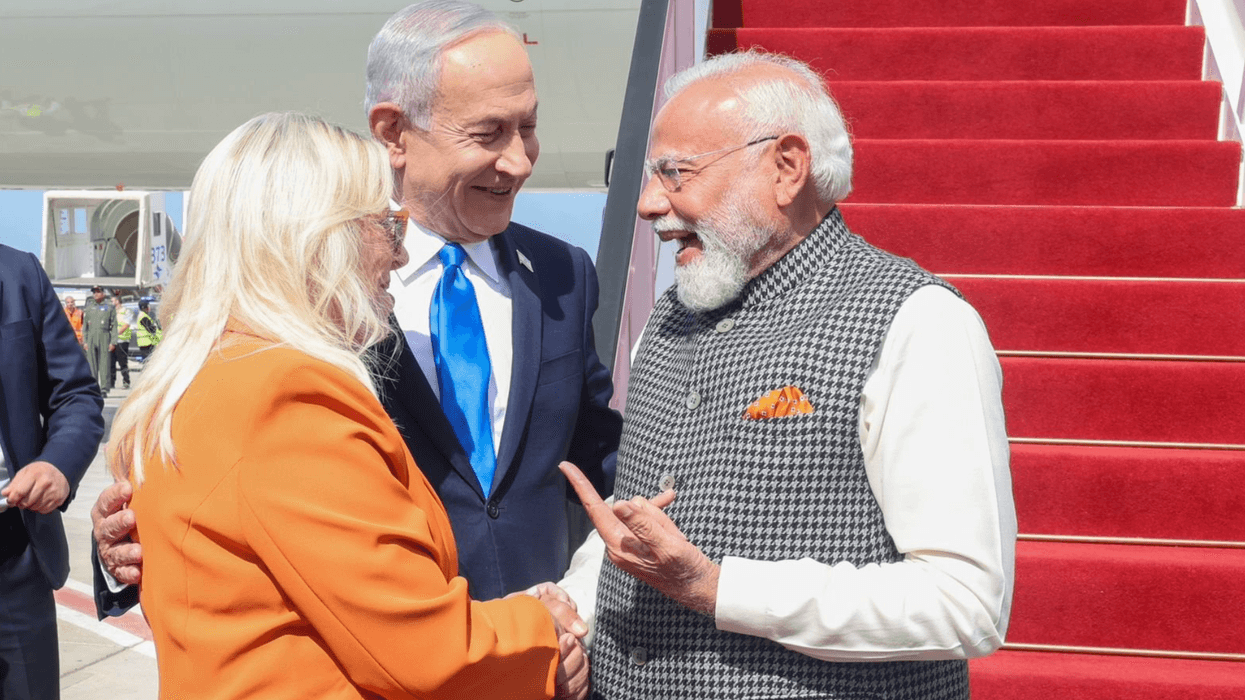LIVE COVERAGE
Our Winter Campaign is falling short.
Without closing this gap, Common Dreams won’t have the funding needed to keep publishing in the weeks and months ahead. No corporate sponsors. No billionaires. We are funded entirely by readers, and these periodic campaigns are vital to our strength and survival.
At a moment when authoritarianism is on the rise and the corporate media is climbing into bed with fascism, nonprofit independent news outlets like Common Dreams need to be expanding our capacity, not cutting back.
Please give what you can to help meet our Winter Campaign goal by March 1. Every contribution moves the meter and helps keep independent journalism alive.
For Now A Prince. How Long Till A (Fake) King?
The arrest of the U.K. rapist formerly known as Prince, and the echoing, trans-Atlantic edict that no one is above the law, lay ever-barer America's "true exceptionalism": A culture of immunity so corrosive our own heinous, in-his-fever-dreams "exonerated" Predator-In-Chief has enragingly yet to face any consequences for his manifold sins, crimes, cruelties and depravities, petty and profound. Finally, says Epstein survivor Maria Farmer, "(Let) all the dominoes of power and corruption begin to fall."
The stunning arrest by Thames Valley Police of "Andrew Mountbatten-Windsor" - notably, not "His Royal Highness," ”the Duke of York" or other niceties - on his 66th birthday was widely seen as not just an arrest but "a transfer of power," a possible, long- awaited shift in the tides for once-untouchable elites of the Epstein class that announces power and status may no longer keep them safe, at least outside the crooked U.S. Shortly after 8 a.m., police arrived in six unmarked vehicles at Wood Farm on King Charles’ Sandringham Estate to haul Andrew off; they also reportedly searched his former residence near Windsor Castle. The charge, "suspicion of misconduct in public office" - talk about your euphemisms - stems from Andrew's term as UK trade envoy from 2001 to 2011, when he allegedly shared with Jeffrey Epstein confidential government reports on potential investment opportunities from Vietnam, Singapore, China and Afghanistan.
The envoy gig mandates a "duty of confidentiality"; any "abuse of public trust" that uses public power as "private currency for self-serving or nefarious reasons" carries a maximum sentence of life in prison. (Just imagine what they'd make of the Trump cartel's brazen, perennial grifting.) Andrew, of course, has also been charged with raping outspoken Epstein victim Virginia Giuffre, who died by suicide last year at 41, which led to him being stripped of his royal titles before slinking out of public view. Regrettably, he never faced a rape charge in court due to several factors - a civil settlement with Giuffre, a high bar for conviction beyond a reasonable doubt, and other legal loopholes. Presumably for some Epstein victims, bringing Andrew to even a modicum of justice on the easier-to-prove misconduct in office charge may feel dispiriting, like nabbing the murderous Al Capone for tax evasion: Better than nothing, but not good enough.
Andrew's was the first arrest of a senior member of the British royal family in modern history. The last one arrested was King Charles I in 1647, following his defeat in the English Civil War by Parliamentarian forces; a believer in the divine right of kings, his tyrannical reign led to his imprisonment, trial for high treason, and beheading in 1649 - the moral arc of the universe moved faster then. After Andrew's arrest, his brother King Charles, who had received no warning beforehand, issued a statement on, not his bro but “Andrew Mountbatten-Windsor”; he expressed “deepest concern" but "whole-hearted support" for the investigation: "Let me state clearly: the law must take its course." Others cited the same probity. Prime Minister Keir Starmer: "No one is above the law.” The family of Virginia Giuffre: "No one is above the law, not even royalty." Heartbreakingly, they added, "For survivors everywhere, Virginia did this for you."
Waxing cautious about possible shifts in power, The Mirror’s Christopher Bucktin notes, "A birthday arrest should not stand alone as a rare spectacle. It should signal something larger: that no title, no fortune, no political office is sufficient armour against the law...Justice cannot stop at one imprisoned accomplice while others retreat behind legal teams and influence." A new report from the UN's Human Rights Council, which finds Epstein's wrongs "may reasonably meet the legal threshold of crimes against humanity," echoes him. Arguing the files' "credible evidence of systematic and large-scale sexual abuse, trafficking and exploitation" - thus contradicting the "little evidence" bullshit of our DOJ and FBI - it dismisses vapid calls to "move on" as "a failure of responsibility towards victims." Resignations alone aren't enough, it adds: "It is imperative that governments act decisively to hold perpetrators (criminally) accountable."
As further evidence "Epstein elites can't hide anymore" - except, yes, infuriatingly, here - active investigations of Epstein-related crimes in 16 countries are now sweeping up officials on both sex-trafficking and corruption charges; Canada will reportedly open the next one. In the UK, former ambassador to the U.S. Peter Mandelson was fired and is under investigation - oops, now arrest - for passing on financial info to Epstein; Starmer’s chief of staff, who appointed Mandelson, also resigned. In Norway, a former prime minister was charged with "gross corruption” for his Epstein ties, and two diplomats are being investigated. In France, so are a former Culture Minister, his daughter and a senior diplomat. Non-Epstein-related justice has also come for South Korea's former President Yoon Suk Yeol - a life sentence with hard labor for an insurrection - and Brazil's Bolsonaro, whose 2023 coup attempt got him 27 years, and no pardons.
"This is what accountability looks like," argues David Kurtz of Andrew's arrest and all the rest, which "sends a signal far beyond London - straight to Washington." What it proclaims: "If the King's own brother is not above the law, neither is the King's dinner guest, nor his Commerce Secretary." Infernally, the lesson has yet to be heeded in an America ruled by a two-bit, 34-count felon and rapist abetted by a cabal of flunkies managing a Mafia-style criminal regime with no bottom and a corrupt SCOTUS whose "out-of-thin-air immunity doctrine" has made him less accountable than actual royalty - spawning a nation "exceptional among developed nations solely in (its) unwillingness to hold the powerful to account, even in the most egregious cases." Confirming that stark reality was last week's unfurling, outside the DOJ, of a huge banner of Dear Leader, "an abomination and an outrage" straight-up declaring our alleged justice system "a pure creature of presidential whim, retribution and cover-up."
Meanwhile, despite Epstein files that "scream 'Guilty" - with his hideous name appearing over 38,000 times in 5,300 released files representing just 2-4% of the grisly whole - Trump had the chutzpah to respond to a question about the possible ripple effect at home of Andrew's arrest by professing, four times in 30 seconds, he's been "totally exonerated." "Well, you know, I'm the expert in a way, because I've been totally exonerated," he blustered, prattling on in toddler-ese. "I did nothin'. It’s very nice. I can actually speak about it very nicely. I think it’s a shame. I think it’s very sad. It’s very, very sad to me. It’s a very sad thing. To see it, and to see what’s going on with his brother. King. So I think it’s a very sad thing." Fucking Christ. Nope, wasn't me, nothing to see here, not a creep, all good, if sad. And not a word on the survivors. Appalled observers: "Guilty as fuck," "The man on my TV screen is batshit crazy," and, "I hope to live long enough to see this POS in a cell with an open toilet." Or maybe none?
Epstein’s carefully curated, now slowly splintering network of elites included billionaires, academics, politicians, scummy MAGA hangers-on like Steve Bannon - “Dude. You up??" - with culpability circling ever closer to Trump. A trove of damning evidence has surfaced, from the removal of 53 files bearing his name to journalist Roger Sollenberger's account of disappeared allegations in a civil complaint and FBI slideshow that the DOJ spoke four times to a Jane Doe who credibly charged she was forced to perform oral sex on Trump when she was about 14; when she bit down on his penis, she said he punched her in the head, kicked her out, and later raped her vaginally and anally. Experts say such emerging stories of abuse reveal a ghastly, familiar pattern; the latest, in Alaska, is "nothing short of horrifying." Thus does Masha Gessen argue that it's time for us to stop speaking of the Epstein story "as a story about extraordinary lawlessness. It is a story about ordinary lawlessness."
Dating back, in Trump's case, a savage lifetime. By now he's committed most of the crimes Thomas Jefferson charged King George with in the Declaration of Independence - ignored laws "necessary for the public good," sent "swarms of Officers to harass our people," kept "Standing Armies without Consent," altered "fundamentally the Forms of our Government," ravaging due process, free speech, health care, civil rights, history itself. The lies, deaths, grift, cruelty, unceasing assaults on decency. The "monstrous machine" to snatch up and spit out thousands of innocents - "¡Libertad!” - in concentration camps. The children trapped with cancer, measles, trauma: "Please get me out of here." Two-month old Juan Nicolás, unresponsive in Dilley, choking on his vomit, abruptly deported with his family to Mexico, tracked down and cared for thanks to "America's most relentless immigration reporter," because, "The story is rarely the policy - (it's) the person standing in the rubble of the policy."
Today, the two essential pillars of Trump's "fantasy version of nationalist renewal" - ethnic cleansing and tariffs - are both rubble, rejected by the public, the courts and even a corrupt SCOTUS, which enraged him so much he revived a cringe John Barron to rave about the "fools and lap dogs” who rejected his cherished tariffs and the imaginary hundreds of billions they brought in to make us '"the hottest country." The drek kept spewing. He praised lickspittles Thomas, Alito, Beer Keg Brett for "their strength and wisdom," especially Beer Keg, "for his, frankly, his genius." He respects them "because they not only dissented, their dissent is so strong. I'm very good at reading language and it read our way 100%...My thousands of victories...Like the wars I stopped. The Prime Minister of Pakistan said I saved 35 million lives by getting them to stop. That's -- and I did it largely with tariffs." He's vowed new tariffs, "and they can all be used in a much more powerful and obnoxious way." So much winning.
Also somewhere he asked the owner of "they made steel products" how he was, and the man said, "I'd love to kiss you," because "we were down to working one hour a week and then you came in and imposed tariffs (and) now we're going to double shifts seven days a week and maybe to 24 hours almost seven days a week, we're hiring people like we haven't - like I've never..." Trump: "Nobody's standing in (the) position I have as president had the insight, the courage, I don't know what it is. They're all pouring into the United States. But just like that great patriot said, Sir, what you've done, nobody thought was possible." As to "slimeball" Gorsuch and Coney Barret, they're "an embarrassment to their families" and were "swayed by foreign interests." Dems were intrigued: The Judiciary Committee's Jared Moskowitz felt he should find out more about them, and another Dem felt the next president "will have no choice but to replace all 9 members with new justices with no foreign entanglements."
On Saturday, the White House held the annual Governors' Dinner, designed to "build relationships and discuss things in a bipartisan way." Historically, the staid, candle-lit, black-tie affair - Melania wore $2,400 silver foil pants - can serve as a genial distraction from Congressional battles. In this rancorous moment, it was a shitshow - actors on both sides alternately called it "a farce" and "a glowing evening" - because after the Mad Hatter King uninvited two Dems, the only Black and only openly gay governor, Dems all boycotted it what became a MAGA ass-kissing fest. Trump used the moment to blame two Dem governors for a sewage spill in the Potomac River. "We have to clean up some mess Maryland and Virginia have left us," he snarled. "It's unbelievable what they can do with incompetence." The ruptured pipe is part of a D.C.-based, federally regulated utility under the oversight of the U.S. EPA. As to "mess," we hope to see this face replicated soon at home.
"It could go either way. There's no other way. You have other ways you can go. You don't have to go that way. You can go other way." - Donald J. Trump, lifelong sexual and financial predator and deeply, deeply shameful President of the United States of America

Big Tech's 'AI Climate Hoax': Study Shows 74% of Industry's Claims Unproven
A report released on Tuesday says that the tech industry is blowing hot air with its claims that generative artificial intelligence will be beneficial for the climate.
The report, titled "The AI Climate Hoax," was commissioned by a broad consortium of environmental advocacy organizations and authored by climate and energy analyst Ketan Joshi.
In total, it analyzes more than 150 statements made by both big tech companies and organizations such as the International Energy Agency about the supposed benefits of generative AI.
The report finds that 74% of such claims made by these institutions are unproven, with 36% not bothering to cite any evidence whatsoever.
One key finding in the report is that many claims about the purported benefits of the technology conflate traditional AI systems with more recent generative AI systems, which require massive amounts of energy and are spurring demand for the construction of power-and-water-devouring data centers across the US.
"Even if these benefits are real," the report writes of traditional AI systems, "they are unrelated to—and dwarfed by—the massive expansion of energy use from the generative AI industry," which is projected to to consume 13 times as much energy as traditional AI by the year 2030.
Even the more supportable claims about the benefits of traditional AI deserve serious scrutiny, the report notes, since "they tend to rely on weaker forms of evidence, such as corporate websites, rather than published academic research," which was only cited in 26% of claims made about AI benefits.
The report also knocks big tech companies for using assorted strategies to conceal the true extent of their energy use, including buying renewable energy certificates even while relying on fossil fuels to power their operations, and vowing to implement highly implausible solutions to mitigate the climate impact of data centers, including carbon capture technologies and even building orbital data centers in space.
Commenting on the report, study author Joshi said its findings seem to show "tech companies are using vagueness about what happens within energy-hogging data centers to greenwash a planet-wrecking expansion."
"The promises of planet-saving tech remain hollow, while AI data centers breathe life into coal and gas every day," Joshi added. "These claims of climate benefit are unjustified and overhyped, and could cover up irreversible damage being done to communities and society."
Jill McArdle, international corporate campaigner at study sponsor Beyond Fossil Fuels, said the study shows "there is simply no evidence that AI will help the climate more than it will harm it," and accused Big Tech companies of "writing themselves a blank cheque to pollute on the empty promise of future salvation."
AI data centers have become a major controversy throughout the US in recent months, as their massive energy needs have pushed up utility bills and put a strain on communities’ water supplies.
A study published in the journal Nature Sustainability last year found that data centers could soon consume as much water as 10 million Americans and emit as much carbon dioxide as 10 million cars, or roughly the same amount of consumption as the entire state of New York.
'The Siege Must Be Broken': Countries Called to Ship Fuel to Cuba After Trump Tariffs Struck Down
With the centerpiece of President Donald Trump's economic agenda—his use of an emergency law to impose tariffs on countries around the world—struck down by the US Supreme Court on Friday, analysts said the sweeping ruling should promptly end the Cuba blockade that his administration has pressured other governments to take part in, leaving millions of Cubans struggling with shortages of essentials.
The court ruled that the 1977 International Emergency Economic Powers Act (IEEPA) does not empower the president to "unilaterally impose tariffs," as Trump has on countries across the globe, insisting that doing so would boost manufacturing and cut the trade deficit—despite mounting evidence that the tariffs have instead raised costs on American households.
Trump also invoked the IEEPA last month when he issued an executive order accusing Cuba of supporting terrorism and posing a security risk to the US, and threatening to ramp up the use of tariffs against any country that sends oil, which Cuba's economy relies on almost entirely for energy, to the island nation's government.
US Secretary of State Marco Rubio has long pushed for regime change in the communist country his family immigrated from in the 1950s, and the administration called on the Cuban government to make “very dramatic changes very soon."
With Trump's use of the IEEPA struck down by the high court, some advocates and observers said that countries should quickly reverse their decisions to join the US in keeping oil from Cuba.
"As far as I can tell, this strikes down Trump's ability to tariff countries that provide oil to Cuba. Hopefully a measure of relief," said Michael Galant, a member of Progressive International's secretariat and a researcher on sanctions. "The siege must be broken."
The court handed down the ruling as the manufactured crisis unfolding in Cuba largely faded into the background in the corporate media, but an article in the New York Times on Friday described how the lack of fuel shipments has left Cubans facing frequent blackouts, gas shortages, growing piles of trash in the streets of Havana and other cities as sanitation trucks aren't running, soaring food prices, and suspensions of some medical care at hospitals.
Researcher Shaiel Ben-Ephraim also described how the "completely unprovoked" oil blockade that was started "with very little public discussion" has led to a "rising mortality rate among the elderly and those with chronic illnesses who cannot access life-support or specialized care" and a surge in diseases such as dengue fever and Orupuche virus, "which have become increasingly fatal due to the shortage of basic medicines and rehydration fluids."
"All this has occurred within weeks. A sustained blockade could lead to hundreds of thousands of deaths. All with no debate, no approval from Congress and no provocation from Cuba," said Ben-Ephraim.
Jorge Piñón, who researches Cuba's oil supply at University of Texas at Austin, told the Times that the country's fuel reserves could be entirely depleted by mid-March.
Trump issued his executive order on Cuba weeks after invading Venezuela, abducting President Nicolás Maduro, and pushing for control of the South American country's oil supply. Venezuela has long been a top provider of oil to Cuba. Trump's tariff threat led Mexico, which became a lifeline for Cuba after the flow of oil from Venezuela stopped, to halt its shipments.
Galant noted that Trump will likely "continue to do all that he can to starve the island," and the president said soon after the Supreme Court announced its ruling that he would use different executive powers to impose a 10% global tariff, suggesting he was not prepared to back down on the tariffs he imposed before taking aim at Cuba.
But critics urged countries that have tried to help Cuba since Trump's executive order, as Mexico has by sending humanitarian aid packages, to reverse their decisions to halt oil shipments to the island.
"So which countries are gonna start sending fuel to Cuba now?" asked organizer Damien Goodmon.
New Poll Shows Platner Romping in Dem Primary and Comfortably Ahead of Collins for Maine Senate Seat
The progressive candidate Graham Platner has a commanding lead in the Democratic primary for Maine's US Senate seat over the state's centrist Gov. Janet Mills. Come November, he's also much more likely than Mills to defeat the Republican incumbent, Sen. Susan Collins.
The University of New Hampshire's Pine Tree State Poll, released Tuesday morning, showed that Platner has built momentum since October. Five months ago, 58% of likely Democratic voters said the 41-year-old oyster farmer was their first choice to be the state's next senator, compared with 24% who preferred the governor.
Now, with the June primary less than four months away, undecided voters have broken hard in Platner's favor: 64% said he’s their first choice, while Mills has only jumped up to 26%.
It's perhaps an unsurprising result, as Democratic voters overwhelmingly support the kind of economically populist anti-oligarchy politics that Platner—a proponent of Medicare for All and a federal billionaires' tax, with backing from labor unions and Sen. Bernie Sanders (I-Vt.)—has unapologetically championed.
But Tuesday's poll suggests his message is not only resonating with Democrats. Where a race between Mills and Collins has the Democrat leading by a single point, within the margin of error, Platner would be expected to win the general election comfortably with 49% of the vote to just 38% for Collins.
The steady shift toward Platner comes as affordability issues have become increasingly salient to Maine voters. A full 35% of voters said that either the cost of living or housing was the most important problem facing Maine.
As President Donald Trump suffers historic unpopularity amid a flailing economy, the most marked shift has been concern about the cost of living. Where just 4% of Mainers said it was their No. 1 issue in March 2025, that number has shot up to 20% this month.
Collins' popularity has been in a dramatic freefall in the era of Trump 2.0, to the point where a late January Morning Consult poll showed her to be the second-least popular US senator, behind only the former longtime GOP leader, Sen. Mitch McConnell (R-Ky.).
While Democratic Party insiders have long argued that voters prefer a safer, moderate candidate when ousting a hated incumbent, observers say Platner's success over the candidate backed by Senate Minority Leader Chuck Schumer (D-NY) and much of the party establishment is redefining what it means to be "electable" in a swing state.
"The fatal part of this poll for Mills isn’t even the massive lead Platner has," said Drop Site News co-founder Ryan Grim. "It’s that he is 10 points more electable against Collins, which is the real priority for Maine voters who don’t want her in office anymore."
New York Times columnist David Wallace-Wells said: "This is a small-sample poll, and there’s a long way to go. But if something like this comes to pass—Platner stomping Mills in the primary, then cruising to a double-digit win in the general election—it wouldn’t just be a Senate-seat victory but a narrative earthquake."
Praising Denver and Other Cities for Leading the Way, Sanders Renews Call for National Data Center Moratorium
Although Denver Mayor Mike Johnston is a vocal supporter of artificial intelligence and has pushed to adopt AI-driven products to power the city's infrastructure, he joined City Council members on Monday in announcing a moratorium on the construction of massive AI data centers—the latest sign, said US Sen. Bernie Sanders, that the push to stop corporations from building the energy-guzzling, pollution-causing facilities is not "radical, fringe, and Luddite" as some claim.
Johnston, a Democrat, and other local officials across the country who are pushing to block the construction of data centers "are right," said Sanders (I-Vt.). "Data centers will have a profound impact on land and water use, and will drive up electricity costs."
As grassroots community groups and experts have warned, AI will also "likely have a catastrophic impact on the lives of working-class Americans, eliminating tens of millions of blue- and white-collar jobs in every sector of our economy," said the senator, who proposed a nationwide moratorium on AI data centers in December.
He renewed that call after Johnston and the Denver City Council announced the city would halt any plans for new data centers for at least several months and would require projects that are already permitted or under construction to follow new guidelines once they're finalized by local officials.
"We need a federal moratorium on AI data centers," said Sanders.
Johnston said in a statement that he believes "data centers power the technology we depend upon and strengthen our economy," but stressed that "as this industry evolves, so must our policies."
"This pause allows us to put clear and consistent guardrails in place while protecting our most precious resources and preserving our quality of life," said the mayor.
The city plans to review regulations for data centers that would target “responsible land, energy, and water use as well as zoning and affordability for ratepayers.”
Soaring electricity bills across the country have been linked to the build-out of data centers, which have cropped up as President Donald Trump has pushed to preempt state and local regulations on AI. As CNBC reported last year, residential utility bills rose 6% in August nationwide, but much higher price hikes were reported in states with high concentrations of data centers, like Virginia (13%) and Illinois (16%).
Sanders' office issued a report last October showing that AI, automation, and robotics could replace nearly 100 million jobs over the next decade, including 40% of registered nurses, 47% of truck drivers, 64% of accountants, and 89% of fast food workers.
And a study published in Nature Sustainability last year found that data centers could consume as much water as 10 million Americans and emit as much carbon dioxide as 10 million cars.
At a forum last week at Stanford University, Sanders joined Rep. Ro Khanna (D-Calif.) in warning that the expansion of AI data centers is meant to increase the wealth of billionaire tech moguls with no regard for how working Americans are affected.
“The question that we should be asking day after day… is who is pushing this revolution, who benefits from it, and who gets hurt?” Sanderss said.
In Denver, the moratorium was announced ahead of a planned community meeting scheduled for Tuesday evening at Geotech Environmental, where neighbors are planning to speak out against the 170,000-square foot DE3 data center being built in the Globeville-Elyria-Swansea (GES) area by the Denver-based company CoreSite.
The burden that will be placed on locals if the project is completed "is not accidental," reads a petition by the local grassroots community organization GES Coalition. “It is the outcome of colonial dispossession and extraction, then decades of zoning, redlining, highway construction, and industrial siting that concentrated pollution next to working-class homes alongside the legacy of the Vasquez Boulevard/I-70 Superfund site, a 4.5-square-mile smelting contamination footprint affecting multiple neighborhoods."
Meanwhile, state legislators have introduced at least two bills regarding AI data center development. One, House Bill 1030, would offer sales and use tax exemptions for data center builders—and would slash state general fund revenue while also triggering a $106 million reduction in tax credits for low-income households.
Another, Senate Bill 102, would require data centers to use renewable energy sources and ensure their energy use does not raise rates for consumers.
Grassroots efforts to block the construction of data centers have taken off in places including Saline, Michigan; Port Washington, Wisconsin; and Tucson, Arizona, where community members successfully blocked plans for a new center owned by Amazon.
State lawmakers in Maine, South Dakota, and Oklahoma are also considering moratoriums or limits on new data centers.
"We need serious public debate and democratic oversight over this enormously consequential issue," said Sanders. "The time for action is now."
Israeli Analysis Affirms Gaza Health Ministry’s Official Palestinian Death Count
An Israeli analysis published Tuesday examining the Gaza Health Ministry's list of Palestinians killed during Israel's US-backed annihilation of the Gaza Strip largely affirmed the official death count, while noting some imperfections in the 2,000-page document.
Haaretz, Israel's oldest daily newspaper, dissected the Gaza Health Ministry's (GHM) database of Palestinians killed by Israeli forces in Gaza, which at the time contained nearly 70,000 names—it's now over 72,000—in part by using artificial intelligence to analyze the massive file.
"A consensus has taken shape: Even if the list has weaknesses, including the fact that it does not differentiate between combatants and civilians, it reflects the scale of the disaster inflicted on Gaza and its people," article author Nir Hasson wrote. "It also forms the basis for allegations that Israel committed war crimes, crimes against humanity, and even genocide."
Lee Mordechai, a historian at the Hebrew University of Jerusalem who says Israeli is committing genocide in Gaza, told Hasson, "It's clear that the list isn't 100% accurate and that it has errors, but I think they're around 1%."
Gabriel Epstein, an associate at the US-based Israel Policy Forum who was formerly skeptical of the GHM list, "now believes it is largely accurate and may even slightly undercount the dead," according to Hasson.
"Epstein reviewed the list obtained by Haaretz," the article states. "He found 24 duplicates and 38 entries with problems in the ID numbers. That means 99.91% of the entries were complete, with verified ID numbers. He also found that 64 deaths that had appeared on earlier lists were later removed, while 158 names removed by March of last year were added back."
The GHM list notably only contains the names of people who died from combat-related violence, not from "hunger, disease, accidents, or the collapse of the health system."
It also does not include the thousands of people who are missing and likely dead and buried beneath the rubble of the 80% of Gaza's buildings that have been destroyed or damaged during the war.
Other research, including multiple peer-reviewed studies in the prestigious British medical journal the Lancet, have also concluded that the ministry was undercounting the number of people killed by Israel's war on Gaza.
As for the issue of Hamas not differentiating between combatants and civilians on the ministry's death list, an investigation last year by Israeli journalist and filmmaker Yuval Abraham and Guardian senior international affairs correspondent Emma Graham-Harrison analyzed classified Israel Defense Forces intelligence data showing that 5 in 6 Palestinians killed by Israeli troops through the first 19 months of the war were civilians. The probe obliterated IDF claims of a historically low civilian-to-combatant kill ratio.
Last September, Former IDF Chief of Staff Herzi Halevi—who was in command for much of the war—said that “over 10%” of Gaza’s approximately 2.2 million people “were killed or injured” since October 2023. Halevi’s acknowledgment tracked with GHM figures showing at least 228,815 people killed or wounded at the time.
In January, Israeli media outlets including Haaretz, the Jerusalem Post, and the Times of Israel reported that the IDF accepted the accuracy of GHM's death count, which at the time stood at over 71,000.
Israeli officials and media, along with their supportive US counterparts during both the Biden and Trump administrations, once cast doubt upon or outright denied GHM figures because the ministry is under Hamas' control. These aspersions came in addition to widespread Israeli and US denials of Israel’s forced famine and starvation deaths and IDF war crimes in Gaza.
"As the months have passed, claims of fabrication and exaggeration have largely remained confined to Israeli television panels," Hasson wrote in the new analysis. "At the end of January, an apparent dispute over the number of dead seemed to end in Israel when a senior army source confirmed that the IDF recognizes that 70,000 people died, precisely the figure cited by Gazan authorities."
"Even if the argument over the total number of dead is, for now, largely settled, disagreement in Israel continues over who the dead were," he continued. "How many were gunmen, how many were affiliated with Hamas, how many were killed under circumstances that meet the conditions of international law?"
"None of this alters the stark figures in the table," Hasson added. "Of the recorded deaths, 20,876, about 30%, are young girls, teenage girls, and women. Another 3,220 were aged 65 and over, including the final name on the list, Tamam al-Batsh, who was 110 when she died."
While Israel officials continue to insist that GHM figures are "misleading and unreliable"—or even "fake"—Hasson noted the general consistency between Israeli and Palestinian tallies across past Israeli attacks on Gaza. During Operation Cast Lead (2008-09), the Palestinian count was 23% higher than Israel's. For Operation Pillar of Success (2012), Israel's tally of Gazan deaths was 11% higher than the Palestinian figure. In Operation Protective Edge (2014), the Palestinian count was 8% higher. And during 2021's Operation Guardian of the Walls, Palestinian officials counted 10% more Gaza deaths than Israel.
The United Nations and US administrations of both major political parties have long acknowledged the GHM's accounting of Palestinian casualties in Israeli attacks, including the assault that began in October 2023.
Hasson noted that "it has been increasingly harder to find Israeli officials commenting on the subject" of the GHM death count in the ongoing war as evidence of its accuracy mounts.
"Since the war began," he said, "Israel has made no serious effort to demonstrate that the list is false or to present an alternative. It has not proven even once that a person listed as deceased is in fact alive."
Trump's Surgeon General Nominee Dodges Senators' Questions on Vaccines, Conflicts of Interest
"Means is another example of President Trump nominating someone with financial conflicts instead of qualifications," said one consumer advocate.
The US Senate's confirmation hearing for Casey Means, President Donald Trump's nominee to be the next US surgeon general, showcased "just how profoundly unqualified" the wellness influencer is to serve as the nation's top doctor, said one consumer advocate after Means dodged questions about her potential conflicts of interest, refused to affirm that anti-vaccine conspiracy theories have been debunked, and spread misinformation about contraception.
Means was nominated to the role on Health and Human Services Secretary Robert F. Kennedy Jr.'s recommendation, and her lack of a current medical license would make her an outlier among past surgeons general. Her license lapsed in 2024, and she did not finish her medical residency at Oregon Health and Science University, leaving in 2018 just months before she was set to complete it because, as PBS NewsHour reported last year, "she came to view the healthcare system as exploitative."
Means then became a self-described "metabolic health evangelist" and a social media wellness influencer, sharing a newsletter with her hundreds of thousands of followers to whom she marketed health products and supplements and earning tens of thousands of dollars in income doing so.
She is also the co-founder of a company called Levels, which offers a subscription for wearable glucose monitors—and which could benefit from Kennedy's endorsement of wearable medical devices.
Means signed a government ethics agreement last September stating she would resign from her advisory position at Levels and stop promoting wellness products for income, but Democrats on the Senate Health, Education, Labor, and Pensions (HELP) Committee, including Sen. Chris Murphy (D-Conn.), had questions about Means' recent potential conflicts of interest.
Murphy noted that Means failed to disclose her financial interests numerous times when promoting her lab testing platform, Function Health; Genova Diagnostics, another testing company that she sponsored; and Zenbasil seeds, a supplement that she recommended in her newsletter and whose maker she had a financial partnership with.
"This seems systemic," said Murphy. "It seems that in a majority of instances in which you were, as a medical professional, recommending a product, you were hiding the fact that you had a financial partnership."
Means responded by accusing Murphy's staff of "intentionally" mischaracterizing the data about her disclosures.
damn, Trump's surgeon general nominee Casey Means is a transparent bullshitter even by the standards of the regime. Watch how she's tries to blame Chris Murphy's staffers for the fact he has her dead to rights on being dishonest and corrupt.
[image or embed]
— Aaron Rupar (@atrupar.com) February 25, 2026 at 11:28 AM
"Means is another example of President Trump nominating someone with financial conflicts instead of qualifications—elevated precisely because of her opposition to the best science and fundamental public health principles," said Robert Weissman, co-president of government watchdog Public Citizen. "We need a surgeon general who understands that public health is, fundamentally, about taking care of each other, not leaving each of us to go it alone."
Considering Means' background, he added, "it is clear that Means will not push back on Trump and RFK Jr. as they put profits ahead of patients and anti-science views ahead of sound public health information. The already broken US healthcare system has been made much worse by Trump and his allies, who have gutted important health agencies and made dangerous cuts to health programs to fund tax cuts for billionaires."
“Casey Means has no place as US surgeon general, and every senator should reject her absurd nomination," said Weissman.
As in Kennedy's confirmation hearing last year, a number of questions from senators were related to Means' views on vaccination. Like the HHS secretary, during her career Means has expressed skepticism about immunization despite scientific studies and decades of evidence that have shown vaccines against diseases like polio and measles have prevented millions of deaths and amounted to some of the most successful public health interventions in history.
On Joe Rogan's podcast in 2024, Means allowed that "one vaccine probably isn’t causing autism" but asked, "What about the 20 that they’re getting before 18 months?”
There is no evidence that the childhood vaccine schedule in the US leads to autism. The increased number of vaccinations children receive today compared to the 1980s and '90s is frequently cited as a concern among vaccine skeptics, but the Children's Hospital of Philadelphia's Vaccine Education Center notes that the "immunological components in vaccines has dramatically decreased" due to "scientific advances in protein chemistry and protein purification that have allowed for purer, safer vaccines."
Means said Wednesday that "anti-vaccine rhetoric has never been a part of my message," but refused to answer several direct questions about immunization.
Sen. Bill Cassidy (R-La.), a physician, asked Means whether she would encourage Americans to be vaccinated against the flu.
Means replied that patients should "have informed consent with their doctor before getting any medication" and said that "vaccines save lives," but did not confirm whether she would endorse the flu vaccine.
CASSIDY: Would you encourage Americans to take the flu vaccine?
CASEY MEANS: I do think it's important as a physician and to rebuild trust in public health to make sure patients are encouraged to have informed consent with their doctors before getting any medication pic.twitter.com/b5JhGUMs5R
— Aaron Rupar (@atrupar) February 25, 2026
She also would not say whether she would recommend the measles vaccine as surgeon general. Nearly 1,000 children have been sickened with the highly contagious, preventable illness in South Carolina, and two children died of measles in West Texas last year, with the outbreaks spreading among the unvaccinated population in the affected areas.
"Would you encourage mothers to vaccinate their children with the measles-mumps-rubella vaccine, seeing how we've had children die?" asked Cassidy.
Means again said only that she is "supportive" of the vaccine but continued to focus her reply on the idea that parents should have "a conversation" with their doctor about immunization against deadly diseases.
Dr. Casey Means, Trump's nominee for surgeon general, won't unambiguously say that mothers should have their kids vaccinated against measles: "I do believe that each mother needs to have a conversation with their pediatrician about any medication they're putting in their… pic.twitter.com/tiqYv7eeAD
— Aaron Rupar (@atrupar) February 25, 2026
Angela Rasmussen, a virologist and Defend Public Health member, said Means' "only apparent qualification for the job of surgeon general is her willingness to promote RFK Jr.’s disinformation and quackery.”
Epidemiologist Elizabeth Jacobs, a member of the group's coordinating committee, added that "the leading US government voice on public health issues... must be someone Americans can trust to give credible advice based on solid science and real data, not a charlatan who specializes in selling expensive, unproven tests and treatments."
"It's time for the Senate to grow a backbone and say, 'Enough!'" said Jacobs, "starting with Casey Means."
Four People on Florida Speedboat Killed in Shootout With Cuban Troops
"This is going to be a shitshow," one social media user said of the deadly encounter, which occurred amid high tensions with the Trump administration.
This is a developing story… Please check back for updates…
In a deadly development that could further strain relations between Havana and Washington, DC, Cuba's Ministry of the Interior announced Wednesday afternoon that four people on a Florida-registered speedboat were killed in a gunfire exchange with Cuban troops in the island nation's territorial waters.
The boat, "with registration number FL7726SH, approached up to 1 nautical mile northeast of the El Pino channel, in Cayo Falcones, Corralillo municipality, Villa Clara province," Cuba's ministry said in a statement shared on social media. When a five-member crew of border troops "approached the vessel for identification, the crew of the violating speedboat opened fire on the Cuban personnel, resulting in the injury of the commander of the Cuban vessel."
"As a consequence of the confrontation, as of the time of this report, four aggressors on the foreign vessel were killed and six were injured," the ministry said. "The injured individuals were evacuated and received medical assistance. In the face of current challenges, Cuba reaffirms its determination to protect its territorial waters, based on the principle that national defense is a fundamental pillar of the Cuban state in safeguarding its sovereignty and ensuring stability in the region. Investigations by the competent authorities continue in order to fully clarify the events."
The New York Times reported that "a US official initially said the firefight had involved a US civilian boat that was part of flotilla to get relatives out of Cuba, adding that the vessel was not a US Naval or Coast Guard boat. But later intelligence confirmed that a single boat had been attacked."
The shootout came as Cubans contend with a humanitarian crisis resulting from President Donald Trump's oil embargo.
The US Supreme Court Friday decision to strike down Trump's use of an emergency law to impose sweeping tariffs sparked fresh calls for countries around the world to send oil to Cuba. Canadian Foreign Minister Anita Anand said Monday that her government is "preparing a plan to assist" the island, and Mexico on Tuesday sent two more military ships carrying humanitarian supplies.
Multiple Florida Republicans, including US Sen. Rick Scott and Congressman Carlos Gimenez, turned to social media to call for a US investigation into the shootout.
Responding to Gimenez's post, GOP Florida Attorney General James Uthmeier announced that "I've directed the Office of Statewide Prosecution to work with our federal, state, and law enforcement partners to begin an investigation. The Cuban government cannot be trusted, and we will do everything in our power to hold these communists accountable."
Also replying to the congressman, Andrés Pertierra, a PhD student in Latin American and Caribbean history at the University of Wisconsin-Madison, said: "Gimenez is already trying to use this to further escalate tensions, but so far we don't have much confirmed information... Let's get the facts first."
Asked about the shooting during an unrelated press conference, US Vice President JD Vance told reporters that he had just been briefed by Secretary of State Marco Rubio, and could only say that it is "a situation that we're monitoring" and "hopefully it's not as bad as we fear it could be."
The Associated Press reported that while at the airport in Basseterre, St. Kitts, Rubio told reporters that "we have various different elements of the US government that are trying to identify elements of the story," including whether the boaters were American citizens or permanent residents.
"Suffice it to say, it is highly unusual to see shootouts in open sea like that. It's not something that happens every day. It's something, frankly, that hasn't happened with Cuba in a very long time," Rubio said.
"The majority of the facts being publicly reported are those by the information provided by the Cubans. We will verify that independently as we gather more information, and we'll be prepared to respond accordingly," he added. "We're going to have our own information on this. We're going to figure out exactly what happened."
Rubio, the son of Cuban immigrants, made clear in an appearance before Congress last month that "we would love to see" regime change in Cuba.
'Disgraceful Act of Complicity': Indian Left Denounces Modi's Israel Visit
"Modi's embrace of Zionist Israel amidst its relentless genocidal assault on Palestine is a betrayal of India's anti-colonial legacy," said one leftist leader.
Indian Prime Minister Narendra Modi's arrival in Israel on Wednesday sparked widespread condemnation among his country's leftists, many of whom accused the Hindu nationalist leader of complicity in Israel's annihilation of Gaza.
Modi was warmly welcomed at Ben-Gurion International Airport by Israeli Prime Minister Benjamin Netanyahu and his wife Sara to kick off a two-day state visit that is expected to focus on issues including military cooperation and arms sales, as Indian purchases of Israeli weaponry have increased exponentially in recent years.
The Indian leader was also joyously greeted at his place of accommodation, the King David Hotel, where in 1946 Jewish militants seeking independence from British occupation carried out a bombing that killed 91 people, including at least 15 Jews.
Modi addressed the Israeli Knesset, or Parliament, lamenting the Hamas-led attack of October 7, 2023 in which 1,195 Israelis and others were killed and 251 abducted. But he said nothing about the more than 250,000 Palestinians killed or wounded by Israel's genocidal retaliation.
He did say that "no cause can justify the murder of civilians." But he was talking about Israeli, not Palestinian, civilians.
"Modi endorsed the brutal killing of 71,000 innocent Palestinians from reckless Israeli bombing," Calcutta-based journalist Seema Sengupta said on social media in response to the Knesset speech. "The death on both sides should've been mourned by him. Instead, he sounded like a partisan leader of a party which gained prominence through disharmony, violence, and bloodshed."
The Communist Party of India-Marxist (CPI-M)—which leads the ruling Left Democratic Front that currently heads the Kerala state government—said it "strongly opposes" Modi's visit, which it called "a betrayal of the Palestinian cause" that "legitimizes the murderous Netanyahu regime."
"The visit comes at a juncture when Israel has been waging a genocidal war in Gaza," the party continued. "Despite a ceasefire, there are daily violations by Israel which conducts strikes killing scores of Palestinians. In the occupied West Bank, there are stepped up attacks on Palestinians and a spurt in illegal settlements."
"The declared intent of the visit is also to deepen strategic, military, and economic ties with a Zionist expansionist regime which seeks to dominate the region with the help of the United States," CPI-M added. "The visit is all the more inopportune because it is taking place at a time when the United States is preparing to attack Iran militarily at the instigation of Israel."
CPI-M General Secretary M A Baby said that "Modi's embrace of Zionist Israel amidst its relentless genocidal assault on Palestine is a betrayal of India's anti-colonial legacy."
The Communist Party of India (Marxist-Leninist) Liberation, whose stronghold is in the eastern state of Bihar, said that it "condemns Prime Minister Narendra Modi’s visit to Israel as a disgraceful act of complicity in the ongoing genocidal assault on the Palestinian people."
"At a time when Palestinian civilians are being massacred, displaced, and starved under a brutal Israeli occupation, this visit amounts to political endorsement and profiteering on Palestinian blood," CPI (ML) Liberation continued. "After mortgaging India’s sovereignty and strategic autonomy to [US President Donald] Trump's racist agenda, Modi is now completely surrendering India’s historic legacy of anti-colonialism and solidarity with the oppressed by visiting Israel."
"Since assuming office in 2014, the Modi regime has systematically imported Israeli models of repression to consolidate its own politics of hate at home," the party added. "From bulldozer demolitions and collective punishment tactics against minorities and marginalized, to the expansion of illegal surveillance infrastructures, the [Bharatiya Janata Party]’s fascist politics has found a role model in Israel."
Israel and India have deepened ties since Modi and the BJP were elected over a decade ago. Both Modi and Netanyahu are right-wing nationalists who utilize religious supremacism to exclude or marginalize Muslims, and both have been accused of increasing authoritarianism, just like their common ally Trump.
Center-leftists including members of the opposition Indian National Congress—which has been criticized for its "pragmatic" engagement with Israel—also condemned Modi's visit.
Left-leaning members of Indian civil society and academia also decried the visit.
Rebuffing Modi's claim that this week's shirtless anti-BJP demonstrations by members of the Indian Youth Congress were an embarrassment for the nation, Delhi School of Economics professor Nandini Sundar said on social media that visiting "genocide-committing Israel has embarrassed and shamed Indians more than a 1,000 shirtless protests."
The activist group Indian People in Solidarity With Palestine and the India chapter of the Boycott, Divestment, and Sanctions (BDS) movement issued a joint statement accusing the "fascist BJP government" of working "hands-in-gloves with genocidal Israel" to "suppress voices of dissent while maintaining a facade of being democratic."
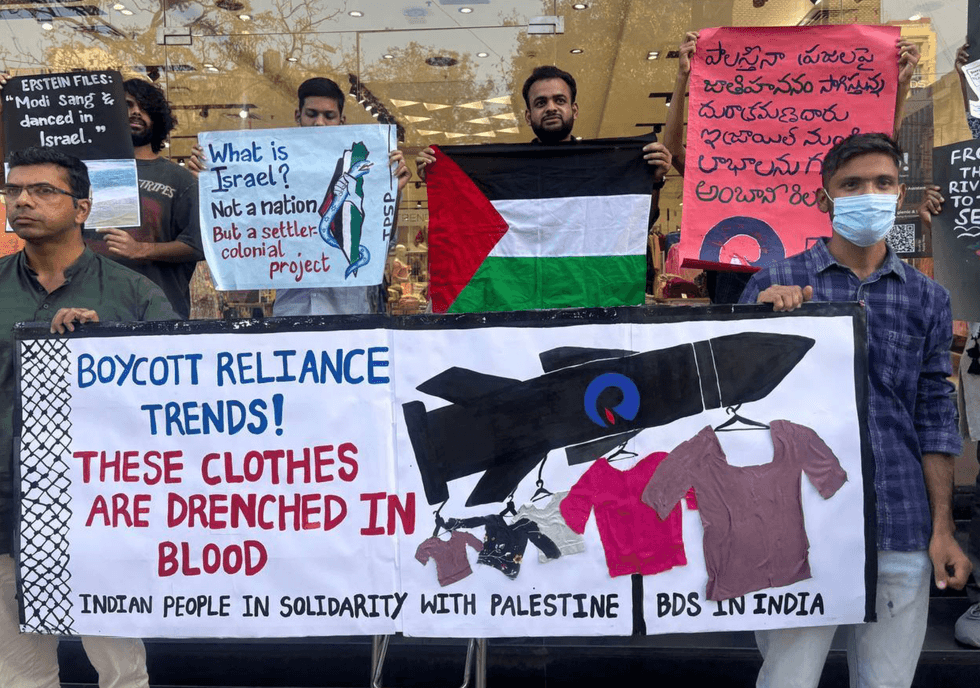
“At a time when the ceasefire is being used as an excuse to bomb and vaporize Palestinians and occupy Gaza," the groups said, "the Indian government is choosing to stand with genocidal Israel and its imperialist masters like America and is working overtime to benefit the corporations from the occupation of Palestine."
Update: This article has been updated with additional remarks from Modi.

